Today we are going to take a look at the Anker 778. This is a Thunderbolt 4 dock that effectively adds more ports to devices equipped with the high-speed port. Since we are starting a holiday week in STH, we have a few pieces that are standard STH fare and a few that are a bit different. This is a bit different, but since we have been using it, we figured why not cover it quickly since we have reviewed many Thunderbolt 4 products this year, such as the Apple Mac Mini M4 and the ASUS ROG NUC.
This is a bit interesting. At $299 which has been the cost for most of 2024, it feels expensive. For the $259 it is for most of the holiday season or sometimes on the flash sales to just over $200 it is a much better value.
If you just want to find the current pricing, you can find the Anker 778 on Amazon (Affiliate Link.)
Anker 778 Thunderbolt Dock Mini-Review
Instead of starting with the front, let us start at what is perhaps the most important side. This is the Thunderbolt 4 port that connects to your notebook, mini PC, or other Thunderbolt 4 device. It also offers up to 100W of power delivery to the connected device. If you have some mini PCs, or a notebook this dock can not only offer more ports, but also act as a charger. If you have a Macbook, buying a power adapter for another desk can often cost $60+ alone.
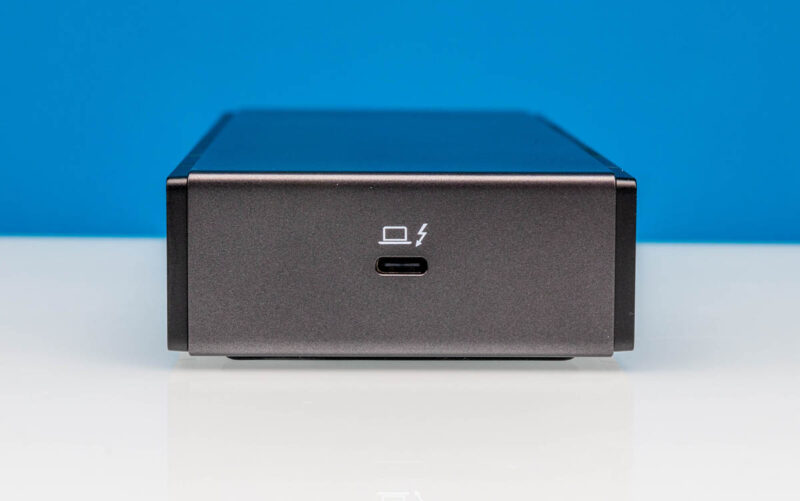
The dock comes with a Thunderbolt 4 cable. These cables do not come with all docks, and often run in the $27-30 range alone.
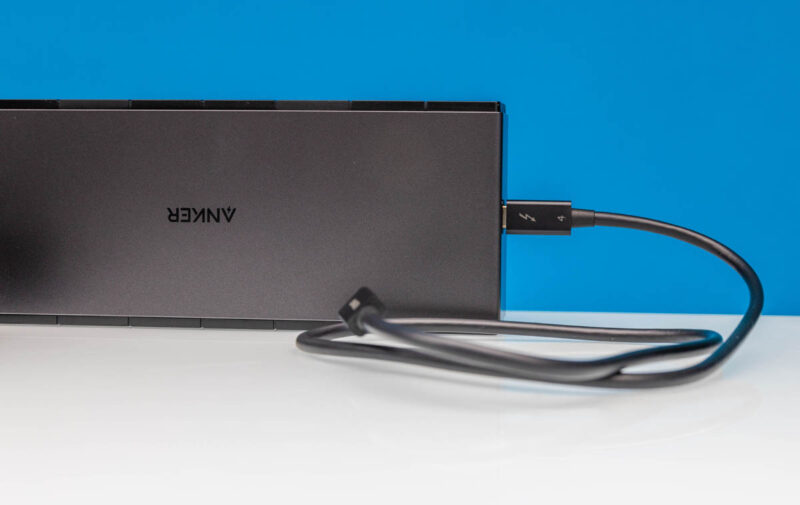
Now for two really neat ports. These are both 30W USB Type-C power delivery ports. This can be useful as a charger or just to power devices as well. These are USB 3.2 Gen2 10Gbps ports.
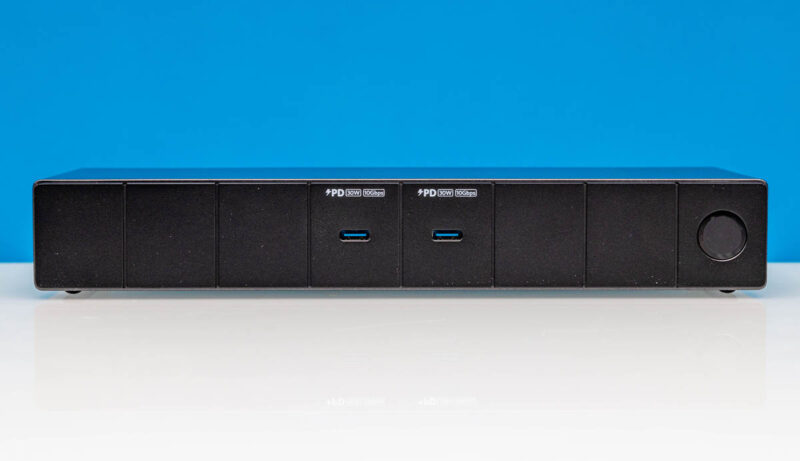
On the other side is where we get many ports. That includes a 20V 9A DC input (180W.) For whatever reason, inside the STH team we think this feels strange. The USB Type-C ports on the other side are the ones we use the most, so it means you have cables coming off of three sides at almost all times. Aside from that power port, you have two USB 2 ports, and two USB 3 5Gbps ports. There is then a 1GbE Realtek powered NIC port which is a bummer. We would have liked to see at least 2.5GbE if not more these days.
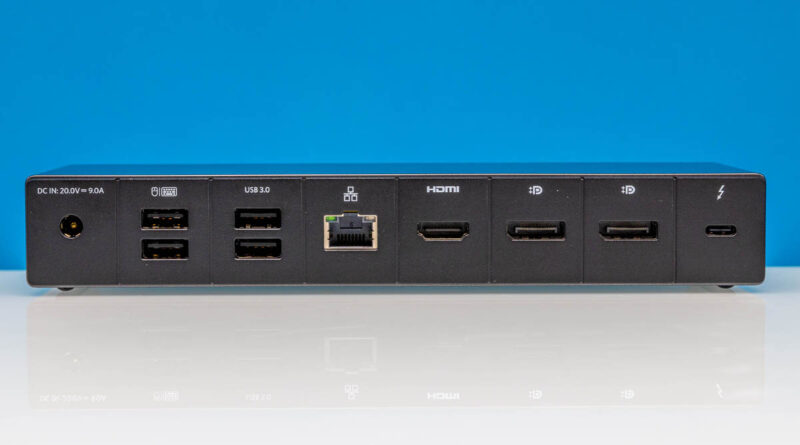
The other ports are the HDMI, two DisplayPorts, and then a Thunderbolt 4 downstream port. Depending on the system you have connected this to, these display outputs are going to have different capabilities. Our best advice is to check for your system what others have experienced with it.
The last side has something a little strange. This is a Kensington NanoSaver lock point. If you are leaving this dock somewhere and want to lock it, make sure you get a NanoSaver. That NanoSaver port is less than a third of the volume of the standard Kensington lock point. In a dock that is this large, it does not feel like it needed a smaller lock point.
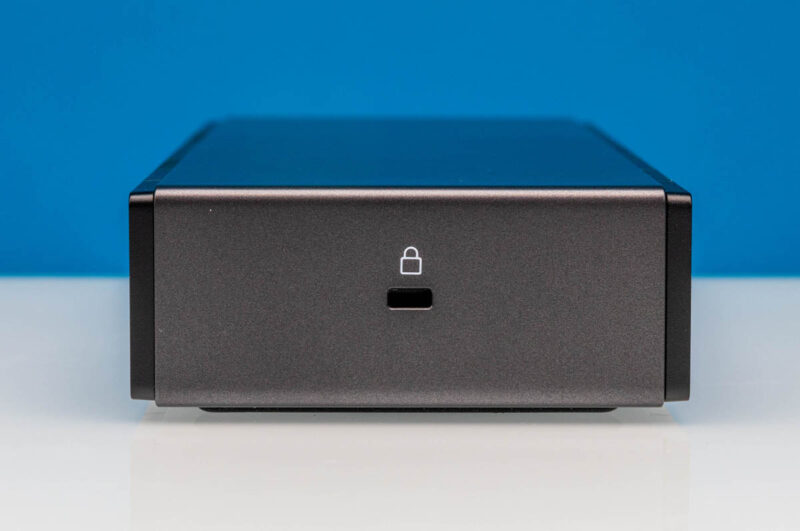
The bottom has nice rubber feet. There is also a mounting accessory for the dock.
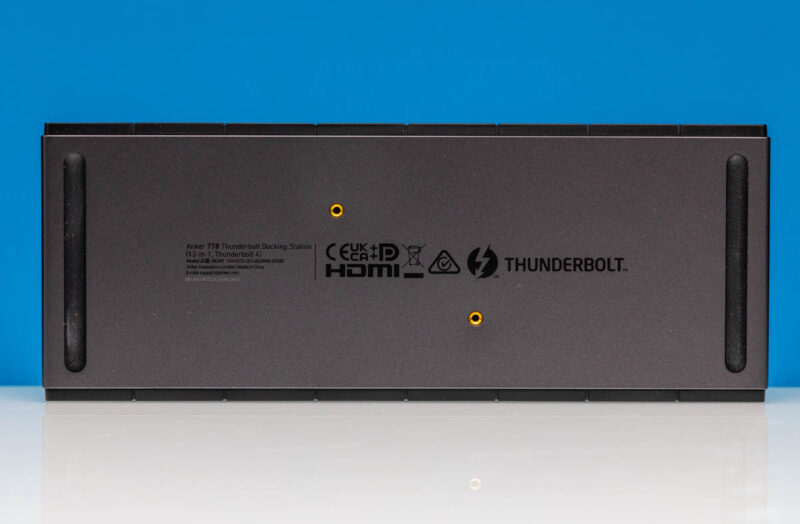
Next, though, is the power adapter. At 180W another way to look at this is that the giant power brick replaces a few bricks you might have otherwise.
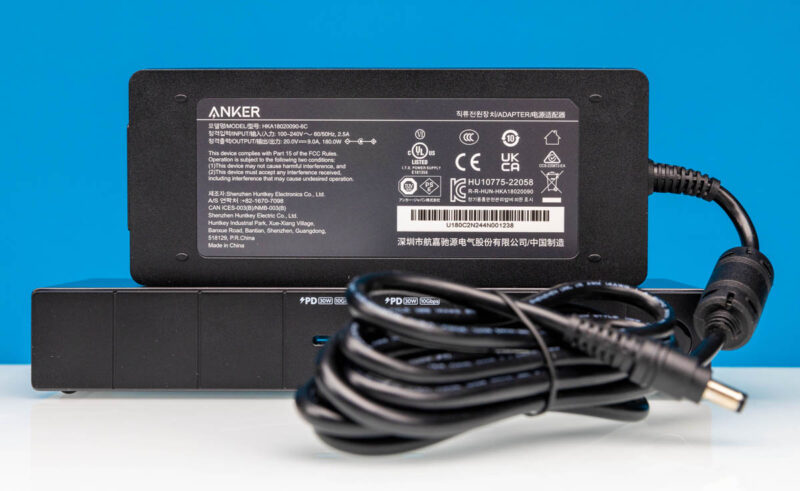
There are a few things we would like to have. For example, it would be nice to have a SD card slot. Another good one would be to have all of the USB ports on the same side. If you put the HDMI, NIC, and power input side away from you to hide cables, then you just have two USB Type-C ports on the side facing you and no Type-A ports. The 2.5GbE port would of course be very welcome as a 1GbE port these days feels old.
Final Words
This is one of dozens of funny products we use each year. It worked reasonably well, for us, and we use it just as a power dock with a few easy expansion ports. For example, the new Mac Mini M4, and Macbooks do not have USB Type-A ports so getting to use a single port to connect to a monitor, power the notebook, and to provide some extra expansion ports and a wired 1GbE connection is useful. On the other hand, it never felt “perfect.” Instead, when it is under $259 it feels like a decent price so long as you need that type of connectivity. While we say it is funny, perhaps the better translation is that we never thought this was the best dock we have used. but we continue to use it.
Where to Buy
If you just want to find the current pricing, you can find the Anker 778 on Amazon (Affiliate Link.) We purchased this unit on Amazon. Something else to look at, since it is a strange pricing quirk, is that the bundle with the Anker 778 and a mount for it can be significantly less expensive than the unit alone without the mount and turn the whole setup into a great value. (Affiliate Link.)

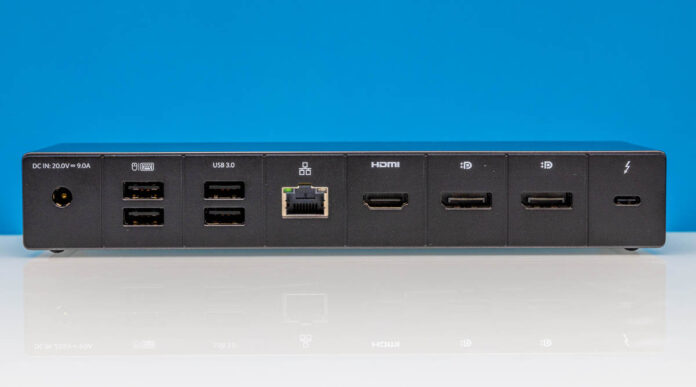
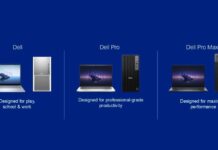

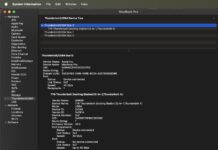
This one seems a little awkwardly positioned at the sticker price. Power delivery allocations look fairly generous; and 3 displays is genuinely better than most of the DP-MST based ‘pure’ USB-C docks are going to give you; but the state of $300 TB docks seems to be toward 4 display outs.
Closer to $200 it’s a lot easier to read as an atypically nice type C dock rather than a rather spartan TB one.
Find a TB dock that has 4 or more USB type-c ports of any speed, including the actual TB4-5/USB4 to host. Ideally one of the device ports free to use being USB4.
But without a single ancient, useless USB type-A present. Zilch. Nada. Such product doesn’t exist. Everything has 2,3 or even 4!! – like here – USB type-A. Insane going into 2025.
Used HP and Dell TB docks with this port selection can be purchased in bulk for $10-30 on eBay.
And for $250 less, those aren’t sullied by USB 2.0 ports; just bizarre and useless in this price range.
It’s 2025. Even my keyboard is Type C.
” inside the STH team we think this feels strange.”
Display, network, kb/m, and power input (barrel jack) toward the back of the desk. The USB-C 30W ports that you like toward the user at the front of the desk. And finally, I/O to host device on side. Doesn’t seem That Weird.
I know it’s xmas, and you’re trying to get everything cleared so you can have a well-earned break… but I need to call this out!
This is a great example of a turd product, and lazy reporting puts it on a pedestal, rather calling it out… which let’s greedy vendors get fat profits from crap products, and worse, leads to some of your readers buying it!
This is more like a USB 3 dock, that has had the Thunderbolt logo etched onto it, and the price doubled.
If your going to publish an article about a product, then at least be genuine about it..
So it’s got 3 monitor outputs, what versions of DP and HDMI are these? What resolutions and refresh rates can they each deliver? What alternative products can be recommended at the same price point?
If anybody is interested, then the OWC TB3 Pro dock is great for a home-lab scenario, which really does the Thunderbolt justice..with 10GbE, additional Thunderbolt port (for Daisy chaining etc)
Caldigit’s TS4 seems like a better device – albeit the price is significantly higher.
5x downstream USB-C ports (2x Thunderbolt-4, 3x USB3.2. gen2 @10gb/s)
5x USB-A 3.2 gen2 10gb/s
SD and MicroSD 4.0 UHS-II
2.5G Ethernet
The one thing which helps justifies the price is the inclusion of 10Gbe Ethernet port. This puts in a separate class from most Thunderbolt docks. Other docks have either 1Gbe or 2.5Gbe. The downside of this 10Gbe port is high heat (lots of comments about how hot it is) and, for some, issues with staying connected at 10Gbe.
Unfortunately this is £369 on Amazon in the UK or the equivalent of around $400 so massively overpriced.